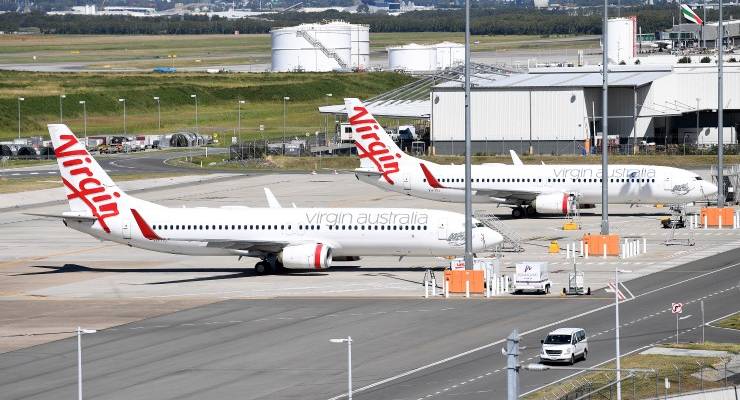
Debt-laden Virgin Australia is in voluntary administration and searching for investors. There are reportedly 10 potential suitors. But there is also the coronavirus. What does the future for Australian aviation look like? Here are some key questions:
Will the travelling public have choice?
A Virgin advertising campaign once claimed it was “keeping the air fair”. Soon we may find out whether this holds true. Without a second airline, we could have no choice when flying domestically once travel restrictions are finally lifted.
Even when Ansett collapsed in the early 2000s, a fledgling Virgin Blue had been flying for a year and quickly took off as it picked up the slack. Aussies haven’t had to rely on just one domestic airline since our aircraft had propellers.
Could there be more passengers than seats?
If the same number of people want to fly and there is no competition, there would be more domestic passengers than seats. (This does assume that domestic travel returns to pre-virus levels or something approaching it.)
If that happens, the only way to manage would be to discard the passengers who are willing to pay the least. Not a bad situation for Qantas: it increases its revenue and fills its shareholders’ pockets. Mum, dad and the kids might have to miss out on seeing grandma this year.
What about the travel points?
An opportunistic Qantas might try to secure Virgin’s corporate market by offering to status match Velocity members who switch to the Qantas frequent-flyer program, shoring up the corporate market and making Australia less attractive to potential competitors.
Is the international market different?
The international aviation market is highly competitive so there the situation is different. Qantas is a small player. Although with higher domestic fares, that holiday to Bali might become more relatively affordable than a domestic trip to the Whitsundays.
Such a situation may have a knock-on effect. Many regional communities depend on the tourist dollar so local economies would struggle and many a barista or dive instructor may find themselves out of work.
While Qantas shareholders may smile all the way to the bank, the same will not be said for our tourism sector, business travellers, regional communities and even the public sector which will face a heftier cost for domestic travel. Higher fares mean less travel, and less money left to spend at their destinations.
Could this be good news for the smaller players?
Anyone outside the capital cities will be aware that there are many more Australian airlines besides the big two. Rex, Alliance, AirNorth and others keep regional communities connected to the cities, sometimes competing with one of the big airlines for passengers. These airlines may find opportunities to grow, especially if the “Spirit of Australia” decides to chase the profits and abandon some less lucrative routes.
So where will the competition come from?
If our new normal is anything like the old normal, investors might believe there is a chance to make a buck. Whether they do that as a Virgin version two or as a start-up doesn’t really matter. Even a resuscitated Virgin Australia will be a very different and smaller airline to the one we had just a month ago. Any new investors have to ask themselves a couple of questions.
Do they want to be a premium full-service product or a cheap and cheerful low-cost alternative? Qantas has both those markets sewn up with its two-brand Qantas/ Jetstar model. Virgin Australia tried to satisfy both with its half pregnant offering which in hindsight was not successful. Carving out a special niche will not be easy.
The new owners will need deep pockets. The rhetoric between Qantas and Virgin has shown that Qantas will aggressively defend its market position. The new airline will need to fight for every passenger.
What if the new owners were foreign?
Things are a little different for foreign investors. A geographically close neighbour may want to base administration, maintenance and crew overseas where labour costs are lower. Crew could be rotated in and out of Australia to operate flights. Very little would need to be based here, making the benefits of competition questionable. Would our federal government allow that? How desperate will it be to create competition?
Who could those investors be?
All airlines around the world are struggling and unlikely to commit a bucket of cash to invest Down Under. However, the secondhand market for aircraft is probably very weak so you would expect there to be a lot of cheap of Boeing 737s with low kilometres that were only piloted by little old ladies at weekends. That leaves us to ponder who might be cashed up and ready to splurge in the middle of the COVID-19 crisis. Unless Kleenex is ready to invest its mega-profits from recent toilet paper sales, your guess is as good as mine.
Martin Hadfield is an aviation blogger and former airline industry worker, specialising in regional aviation.







Crikey is committed to hosting lively discussions. Help us keep the conversation useful, interesting and welcoming. We aim to publish comments quickly in the interest of promoting robust conversation, but we’re a small team and we deploy filters to protect against legal risk. Occasionally your comment may be held up while we review, but we’re working as fast as we can to keep the conversation rolling.
The Crikey comment section is members-only content. Please subscribe to leave a comment.
The Crikey comment section is members-only content. Please login to leave a comment.